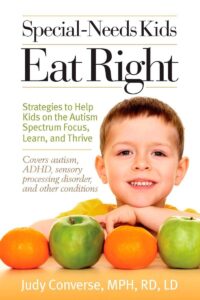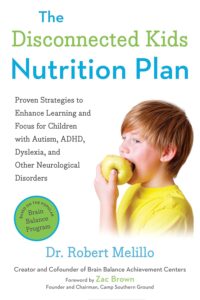Many autistic children struggle with eating. This can be due to sensory issues with food such as the texture, taste, smell or temperature. Others are more inflexible about what they will eat because of the way they think about food. Some autistic children have digestive problems, so eating means they don’t feel well. For autistic children with ADHD, they may struggle to eat since a decrease of appetite is a side effect of some medications. As a parent, you worry about whether your child is getting enough nutrition for healthy development. So when do you need to seek nutrition counseling for your child with autism and their eating habits?
Who provides nutrition counseling for children with autism?
If you are looking for nutrition counseling, the best expert to see is a registered dietitian (RD) or registered dietitian nutritionist (RDN). According to the Cleveland Clinic website, both are a credentialed specialist who “apply their knowledge of nutrition to develop dietary strategies to meet the health needs of populations and individuals.”
Dietitians provide food education, meal planning and other services related to nutrition. For those who specialize in working with autistic children and adults, they also can help with the following:
- Identifying nutrition deficiencies
- Reducing mealtime stress
- Creating meal plans for specific diets if your child has been diagnosed with a digestive issue
- Helping parents expand their child’s food choices
- Decreasing anxiety related to food
When should you consider nutrition counseling for your child?

My son J went through a period where he lost a lot of weight due to decreased appetite from a medicine along with a stressful social situation at school. We were really worried about him since he was eating so little, and we wanted to maximize the nutrition in the foods when he did eat. His primary care doctor referred him to a dietitian at our local hospital system. She was great about teaching him how certain foods packed the nutrients, especially protein, that he needed. She developed a plan for him with the foods he liked and when he would generally eat. He didn’t follow everything, but I felt much better that he was eating food that was providing his body the vitamins and minerals he needed. He finally got through that phase and now eats more and has expanded his palate to a larger variety of food.
So when should you consider nutrition counseling for your child with autism? You may want to seek a registered dietitian’s help when:
- Your child is diagnosed with a gut or digestive issue.
- You feel like your child is not getting enough of the nutrients they need for proper development.
- Your child is struggling with stress and anxiety related to food.
- You want to work with a dietitian to encourage your child to eat more new foods.
- Your child struggles with eating due to food allergies.
- You need help with meal planning for your child to ensure they are getting the nutrition they require.
How can you find a dietitian for your child?

Dietitians work in a variety of settings. You can find one through any of the following ways:
- First start by asking your child’s primary care physician or pediatrician for a referral to a registered dietitian.
- You could also look on your health plan’s website or call the member services line to find out which dietitians are in-network nearby that are covered by your insurance.
- Ask other parents of autistic children in your area who you know through school or activities if their children have ever seen a dietitian and if they could recommend the one they saw.
- Call your local autism organization. Most of them have lists of local resources, so they may be able to point you to local registered dietitians.
- Inquire to your child’s case manager for the autism waiver to see if it is a covered service in your state.
- Search for RDs who are available in your area and research them online.
Have you sought nutrition counseling for your child with autism? What was your experience and what tips would you give other parents for finding nutrition counseling? Leave a comment below so that we can share and encourage each other on this journey.
Additional resources
Do you want to find out more about this subject? Check out these resources that are available.
Special-Needs Kids Eat Right: Strategies to Help Kids on the Autism Spectrum Focus, Learn, and Thrive (affiliate link)

Autism Recipe: Using Trust and Joy to Take Control of Wellness (affiliate link)

My Magical Foods – Get Picky Eaters to Choose Veggies and Fruits! (affiliate link)









